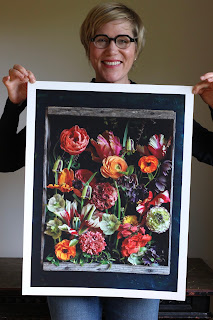Christin
Geall is a Canadian writer, designer, photographer, and author of Cultivated: Elements of Floral Style
(Princeton Architectural Press, 2020). Her writing and floral work focuses on
the intersections of nature, culture, and horticulture, and she teaches internationally.
Trained in horticulture at the Royal Botanic Gardens, Kew, she completed a BA
in Environmental Studies & Anthropology and a MFA in Writing (at the
Stonecoast Program in Maine, which is where we met), and has been a writing
professor and gardening columnist for Gardenista. Architectural
Digest called her book “delightfully
vibrant” and the Seattle Times recently quipped "Geall
might just be the M.F.K. Fisher (American grande dame of food writing) of
flowers."
Please
welcome Christin Geall
Flash
nonfiction? The segmented memoir? The prose poem? When I was in graduate school
studying creative nonfiction, I mastered none of these forms. Despite a
background as a lifestyle columnist and editor, I couldn’t write both
poetically and short. But I yearned to, so I studied stylists like
Abigail Thomas, MFK Fisher, and Annie Dillard.
To
get one thing straight right away: I’m a terrible storyteller. And not a great
consumer of aural nonfiction stories, either. At dinner parties I’d sooner
listen to someone tell a tale as watch them pick their teeth. I like ideas,
conversation, and a bit of banter, yes, but I didn’t think myself ironic enough,
clever enough, or frankly even online enough, for Twitter. And Facebook, well,
I found it either too political or too congenial for decent exchange of thought,
much less story.
Enter
the image as a writing prompt. A subject for discussion, and suddenly all my storytelling
and audience problems were solved. Looking back on how I accumulated 97,000 Instagram followers, and the
success of my recent book Cultivated: The Elements of Floral
Style
(Princeton Architectural Press, 2020), I see now how my training in the
micro-essay changed my career as well as my relationship to nonfiction.
I
had evolved into a personal essayist, memoirist, and an academic by the time I
joined Instagram in 2015, yet I had always struggled to write the longform
pieces that my career required. I did possess a deep knowledge and love for
plants, so I had thirty years of passion to write about, in addition to a
fascination with the ideas and language of the fine arts. Creativity is
universal—what I’d learned in grad school about the process of writing,
workshopping and critique, I applied to my work with flowers – and then to how
I’d tell short stories around them.
On
Instagram, where a post is driven by one image, you are limited to 2,200
characters, or roughly about 350 words. Given I’m more sprinter than
marathoner, the platform fit. Those 350-ish words, I found, are ample space for
a concept to be explained, an idea explored, or even a bit of narration.
As
I lobbed ideas to a hash-tagged audience and reflected on their comments, I
found my thinking (and opinions) refined. As I encountered friction, or
clarification, I entered into conversation. I made friends, of course, learned,
networked, and steadily over the past few years, became a sought-after voice in
my field.
When
the speaking invitations arrived, I was ready; I built my talks with multiple
short “stories” about flowers and the ways they connect us with nature, painting,
history, ourselves—just as a good essayist, memoirist, or columnist might do on
the page.
By
the time the book deal happened—a book combining my photographs with short
essays on style, creativity, and everything from Baroque music to wabi sabi to
the psychology of colour—I not only had an audience who wanted to learn more, but
also 20,000 of the 40,000 words needed for the book.
Photography
was not something I’d ever truly wanted to learn, but now that I have, I’m
grateful for its silence and the way it pulls me creatively. At first, I had to
stretch to create images I thought worthy of an Instagram post, let alone a
book, but as I learned to use a camera I found the art itself became another
subject for inquiry, which is of course, always a good thing for an essayist.
Long or short form.
Note
from Lisa: You can connect with Christin at her website, and on Instagram, Facebook, or Twitter. You can find
her book, Cultivated, at major online retailers, or order
from Indiebound or through your local independent bookstore.

